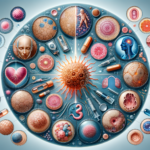Understanding Estrogen-Positive Breast Cancer
Estrogen-positive breast cancer, also known as estrogen receptor-positive (ER+) breast cancer, is a type of cancer where the growth of cancer cells is fueled by the hormone estrogen. This subtype of breast cancer accounts for approximately 70% of all breast cancer cases, making it the most common form. Understanding the biology of ER+ breast cancer is crucial as it helps in designing targeted treatments that can effectively manage the disease.
Estrogen receptors are proteins found inside or on the surface of certain cells. When estrogen binds to these receptors, it can stimulate cancer cell growth. ER+ breast cancer is often treated with hormone therapy, which aims to block the cancer cells from receiving the hormones they need to grow. This can be achieved through medications that lower estrogen levels in the body or that block the estrogen receptors.
The prognosis for ER+ breast cancer is generally favorable compared to other types, largely due to the effectiveness of hormone therapies. However, the challenge remains in managing cases where the cancer becomes resistant to treatment, necessitating ongoing research and development of new therapeutic strategies.
Traditional Estrogen Treatments for Breast Cancer
Traditional treatments for estrogen-positive breast cancer have primarily focused on hormone therapies such as selective estrogen receptor modulators (SERMs) and aromatase inhibitors. SERMs, like tamoxifen, work by binding to estrogen receptors on cancer cells, preventing estrogen from attaching and stimulating growth. Aromatase inhibitors, on the other hand, reduce the amount of estrogen produced in the body, thus limiting the hormone’s availability to cancer cells.
These treatments have been pivotal in improving survival rates and are often used in both premenopausal and postmenopausal women. However, they are not without side effects. Patients may experience symptoms such as hot flashes, joint pain, and an increased risk of blood clots and bone thinning. Despite these challenges, these therapies have been a cornerstone in the management of ER+ breast cancer.
In addition to these, ovarian suppression therapies are sometimes used in premenopausal women to reduce estrogen production by the ovaries. This can be achieved through surgery, radiation, or medication. Each of these treatments has its own set of considerations and potential side effects, highlighting the need for personalized treatment plans.
Innovations in Estrogen-Positive Breast Cancer Treatment
The landscape of estrogen-positive breast cancer treatment is rapidly evolving with the advent of new therapies and approaches. One of the most promising areas of development is the use of CDK4/6 inhibitors. These drugs work by interrupting the cancer cell cycle, preventing cells from dividing and growing. When used in combination with hormone therapies, CDK4/6 inhibitors have shown to significantly improve progression-free survival in patients with advanced ER+ breast cancer.
Another innovative approach is the use of selective estrogen receptor degraders (SERDs). These drugs not only block the estrogen receptor but also promote its degradation, potentially overcoming resistance seen with traditional hormone therapies. Clinical trials are ongoing to evaluate the effectiveness and safety of SERDs in comparison to existing treatments.
Immunotherapy is also being explored as a potential treatment for ER+ breast cancer. Although traditionally more successful in other cancer types, researchers are investigating ways to harness the immune system to target and destroy breast cancer cells. These advancements represent a shift towards more targeted and personalized treatment options, offering hope for improved outcomes.
Challenges and Considerations in Treatment Development
While the development of new treatments for estrogen-positive breast cancer is promising, several challenges remain. One of the primary issues is drug resistance. Over time, cancer cells can adapt to the treatments, rendering them less effective. This necessitates ongoing research to understand the mechanisms of resistance and develop strategies to overcome it.
Additionally, the side effects of new treatments can impact a patient’s quality of life. Balancing efficacy with tolerability is crucial in ensuring that treatments not only extend life but also maintain its quality. This is particularly important for breast cancer, which often affects women at a younger age and has long-term implications for their health and well-being.
Another consideration is the cost and accessibility of new treatments. Cutting-edge therapies can be expensive, and not all patients have access to them due to geographical or financial constraints. Efforts to make these treatments widely available and affordable are essential in the fight against breast cancer.
The Future of Estrogen-Positive Breast Cancer Treatment
Looking ahead, the future of estrogen-positive breast cancer treatment is bright, with ongoing research and clinical trials paving the way for more effective and personalized therapies. The integration of genomics and precision medicine is expected to play a significant role in identifying the most suitable treatments for individual patients based on their genetic profile and the specific characteristics of their cancer.
Moreover, the combination of existing therapies with new agents is likely to enhance treatment efficacy and overcome resistance. Researchers are also exploring the potential of lifestyle interventions and complementary therapies to support traditional treatments and improve patient outcomes.
As we continue to unravel the complexities of breast cancer biology, collaboration between researchers, clinicians, and patients will be key to translating scientific discoveries into practical treatments. With these efforts, there is hope that one day breast cancer will be a manageable, if not curable, disease for all patients.








